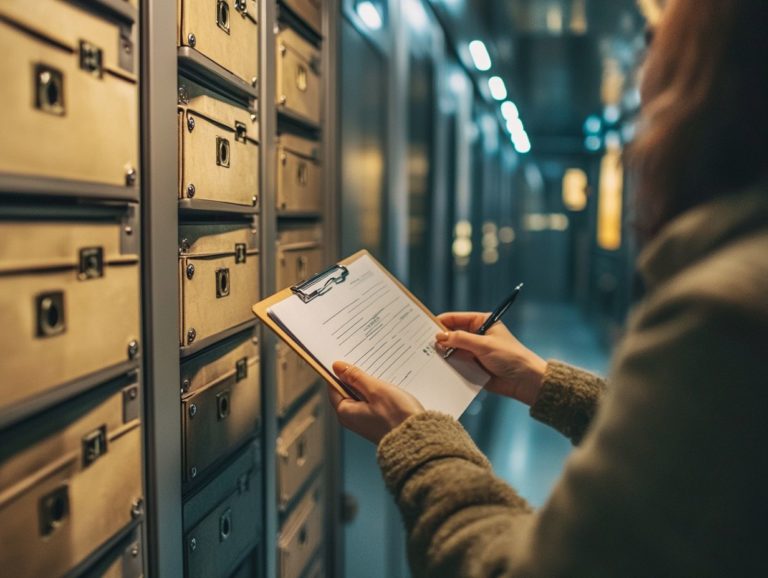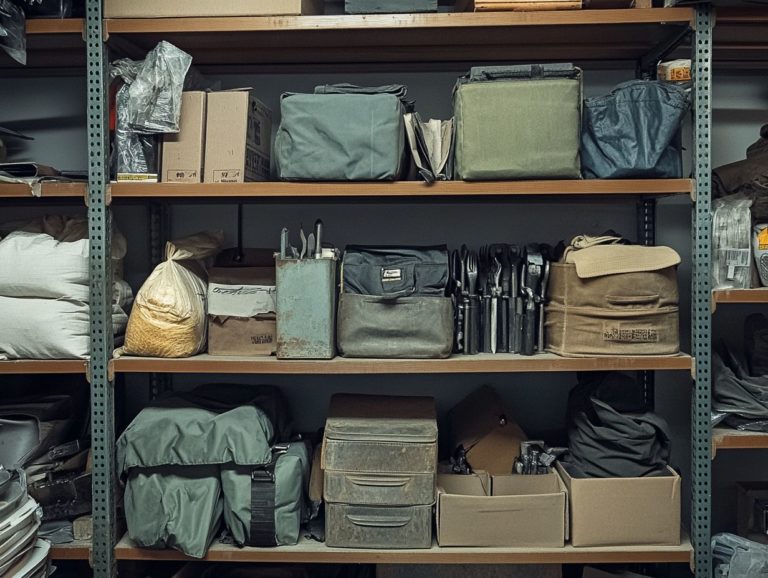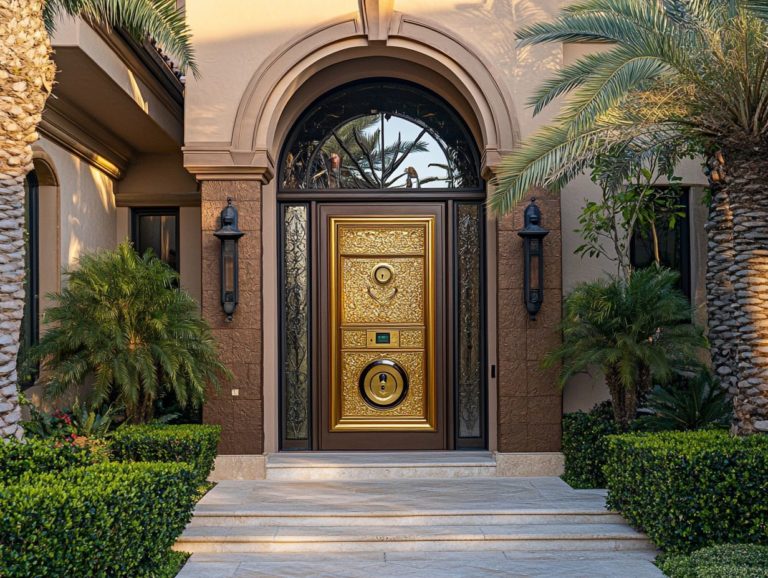Understanding Storage Costs for Precious Metals
Investing in precious metals requires a deep understanding of storage. Safe storage is just as important as the investment itself.
From gold and silver to platinum and palladium, these assets need secure methods to maintain their value. This article will reveal what precious metals are and why proper storage is crucial.
You will learn about the factors that influence storage costs. By comparing different options, you can protect your investments effectively.
Contents
- Key Takeaways:
- Factors Affecting Storage Costs
- Types of Precious Metals Storage
- Comparing Storage Costs: Make the Right Choice!
- Frequently Asked Questions
- How much do you pay to store precious metals?
- What types of storage options are available for precious metals?
- How are storage costs calculated?
- Are there any factors that can affect storage costs for precious metals?
- Can storage costs for precious metals be negotiated?
- What are some important considerations when choosing a storage option for precious metals?
Key Takeaways:

- Precious metals like gold and silver are valuable and durable assets.
- Secure storage protects your metals from theft and damage.
- Factors affecting storage costs include the type of metal, location, and method.
What are Precious Metals?
Precious metals like gold, silver, and platinum are not just shiny items; they are valuable investments. Many view them as safe havens when economic uncertainties arise.
They help protect against inflation and currency changes. This makes them ideal for diversifying your investment portfolio.
These metals are durable, divisible, and hold intrinsic value. You can invest in physical bullion, ETFs, or mining stocks based on how much risk you can take.
These assets can be easily converted to cash, offering security during tough times. Adding precious metals to your financial plan strengthens your asset protection.
Why is Storage Important?
Storage is crucial for keeping your precious metals safe from theft, loss, and damage. A secure facility with strong security measures is essential.
Proper storage also means having enough insurance to protect your assets. This ensures their value remains intact even when market conditions fluctuate.
Consider the fee structure of your chosen storage solution. Implementing access controls ensures only authorized people can reach your stored metals.
Independent audits maintain trust and verify the integrity of your storage provider. Financial advisors can provide insights to develop a solid investment strategy.
Factors Affecting Storage Costs
Storage costs depend on factors like the type of metal, your storage location, and the method you choose.
Understanding the fee structure is essential. Consider additional costs such as insurance and the reputation of your storage provider, as these can impact the total expense.
Type of Metal
The type of metal you choose affects your storage costs. Precious metals like gold, silver, and platinum have distinct values and fees.
Gold often incurs higher storage expenses because of its elevated market value. This difference requires tailored storage solutions for precious metals that cater to each metal’s unique attributes.
Gold is celebrated for its ease of converting into cash, which often demands more sophisticated security measures, potentially increasing costs further. Conversely, while silver holds significant value, it tends to be bulkier, leading to lower insurance costs. It’s important to understand storage insurance for metals, yet it requires careful consideration of storage space.
Current market conditions, characterized by volatility and fluctuations in demand, can impact both the cost of storage and the insurance coverage essential for protecting these investments. Tax implications are also important to your long-term storage strategies, as storing metals for extended periods may lead to different tax obligations, depending on your jurisdiction.
Storage Location
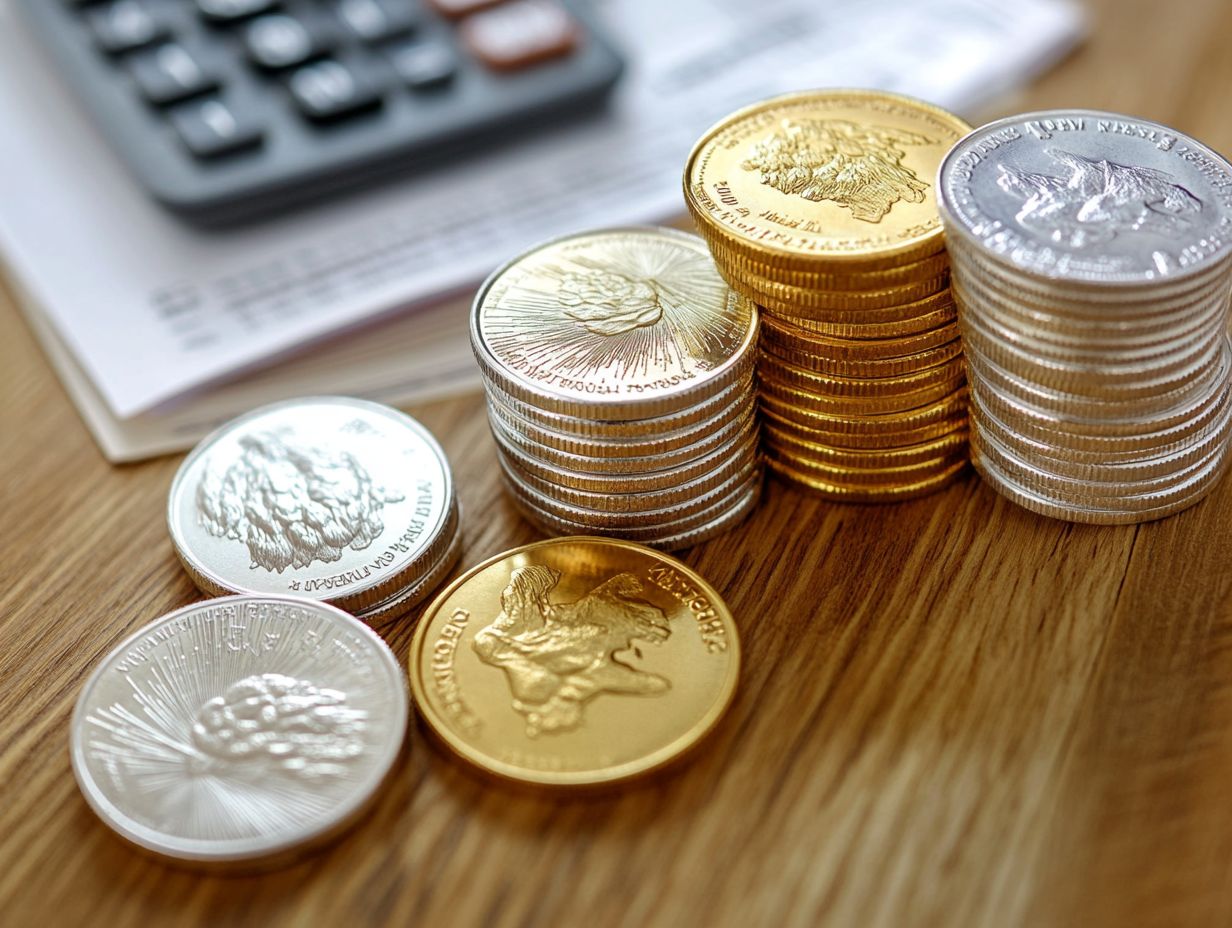
Your choice of storage location greatly influences costs. Different facilities offer varying security measures and operational policies. Opting for a reputable provider can profoundly influence both the safety and the expense of storing your valuable assets.
The impact of location on security protocols is significant. Facilities adhering to regulatory standards generally implement rigorous auditing processes and advanced access controls to safeguard your investments. This clarity in fee structures is vital as it illuminates potential hidden costs and fosters trust between you and your provider.
When selecting a facility, make sure to carefully consider not just its security features, but also its commitment to regulatory compliance. Together, these factors ensure a secure and cost-effective storage solution for your assets.
Storage Method
The way you choose to store precious metals can vary greatly, with options like home storage, third-party storage facilities, and bank safe deposit boxes all of which come with their unique benefits and drawbacks. Understanding the implications of each gives you the power to make informed decisions about protecting and managing your assets.
Home storage offers convenience and immediate access, allowing you to trade or utilize your metals at a moment’s notice. However, it exposes your assets to risks like theft and natural disasters. You might also find yourself lacking adequate insurance coverage. Additionally, it’s important to be aware of understanding inheritance taxes on precious metals when considering your storage options.
On the other hand, third-party storage facilities provide enhanced security features, including surveillance and climate control, though they might come with higher fees and less accessibility.
Bank safe deposit boxes offer an extra layer of protection and typically include insurance. However, keep in mind that access is usually limited to business hours, which can be a challenge if you need liquidity quickly.
Ultimately, it’s crucial to weigh these factors against your own risk management strategy to ensure effective investment in precious metals.
Types of Precious Metals Storage
You have many precious metals storage options, such as home storage, bank safe deposit boxes, and third-party storage facilities. Each choice presents distinct levels of security and accessibility.
Understanding these options is vital for protecting and managing your assets effectively within your investment portfolio.
Keep Your Precious Metals Safe at Home!
Home storage allows you to maintain physical possession of your precious metals, giving you direct access and a comforting sense of security. However, this approach comes with unique risks, such as theft or loss, which can challenge asset protection.
Setting up good security measures is crucial. Conduct thorough inventory reports to track your assets and ensure an accurate assessment of your holdings. While having your assets at home offers peace of mind, the responsibility rests on your shoulders. You need to evaluate your own risk tolerance (your comfort level with potential losses). Without adequate insurance coverage, any loss could lead to significant financial repercussions, potentially overshadowing the benefits of direct access.
Balancing these advantages and disadvantages requires careful consideration of how to protect your investments.
Secure Your Valuables in a Bank Safe Deposit Box!
Using a bank safe deposit box provides a secure way to store your precious metals. Banks typically implement rigorous security measures and offer insurance coverage against loss or theft, giving you peace of mind. Keep in mind that access to your valuables may be limited based on the bank’s operational policies and possible withdrawal fees.
These storage solutions are more reliable than home safes, thanks to advanced surveillance systems and robust vault doors. However, some users find that accessibility can be a challenge, especially during emergencies, when retrieving items may take longer than expected.
The costs of renting a safe deposit box can vary. Make sure to ask about the transparency of fees and any restrictions regarding the transferability of items. Being informed about potential limitations empowers you to make the best decision for your storage needs.
Explore Premium Third-Party Storage Facilities!
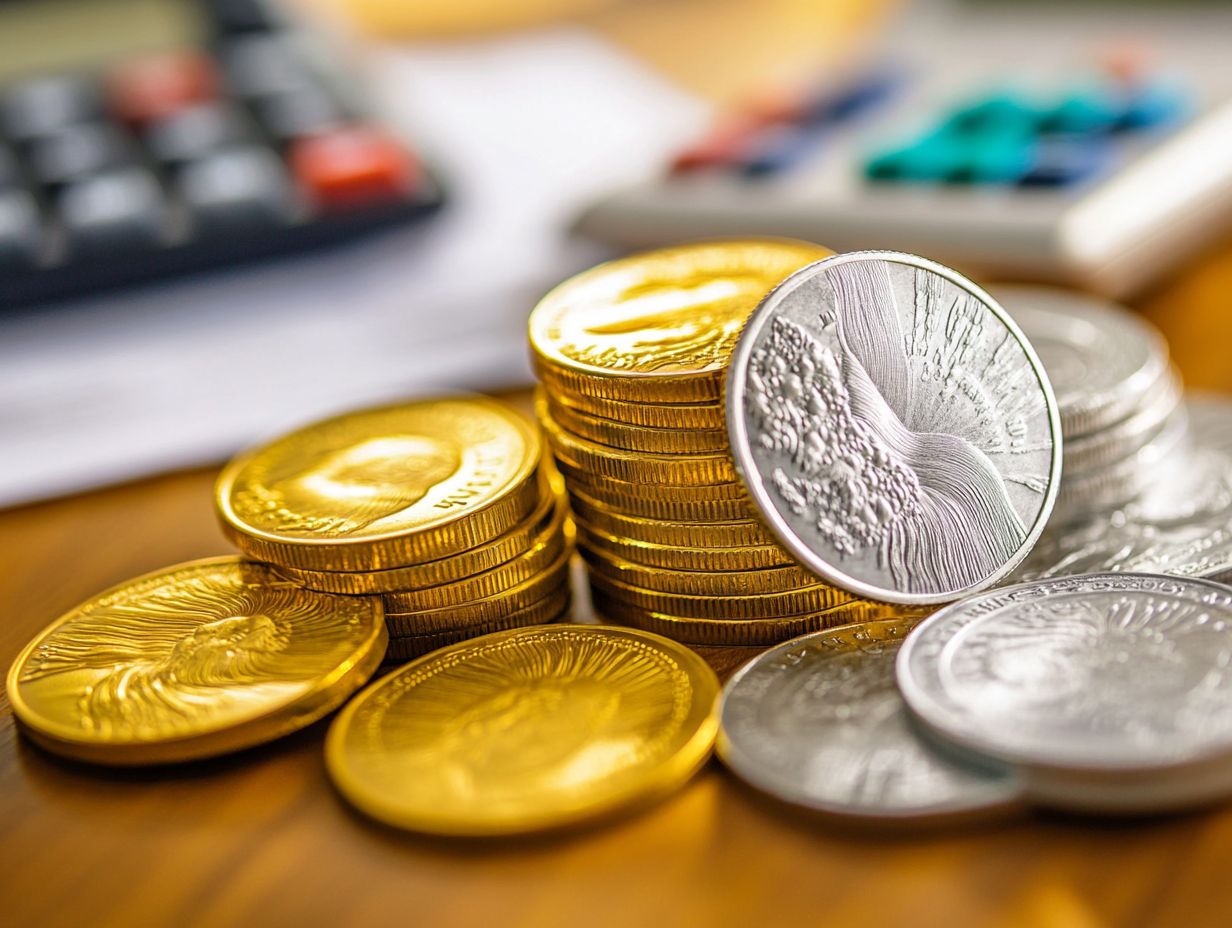
Third-party storage facilities offer a premium solution for your precious metals, equipped with advanced security measures, independent audits, and transparent fee structures. This option is ideal for investors like you who seek peace of mind and regulatory compliance in managing valuable assets.
Using these specialized services ensures enhanced protection against theft and damage, keeping your investments secure. Many facilities employ experienced professionals who prioritize customer service, guiding you through the complexities of ownership and storage with expertise.
Robust auditing processes allow you to confidently track your investments. While it’s wise to consider management fees, the overall benefits of safety and peace of mind typically far outweigh the costs. Third-party storage is an appealing choice for anyone serious about safeguarding their wealth!
Comparing Storage Costs: Make the Right Choice!
When investing in precious metals, comparing storage costs is essential. Different options come with various fee structures, management fees, and overall expenses that can significantly impact your bottom line.
Conduct a detailed cost analysis to pinpoint the most cost-effective solutions that align seamlessly with your investment strategy and financial objectives.
Cost Analysis for Different Storage Options
Conducting a cost analysis of various storage options gives you the power to compare storage costs comprehensively. You’ll want to consider factors like fee structure, management fees, and additional insurance options. This analysis is essential for making informed investment decisions and refining your investment strategy.
Assessing liquidity within these storage alternatives enables you to determine how quickly you can access or convert your assets into cash, especially crucial during times of economic uncertainty.
You can strategically compare storage fees against prevailing market conditions to pinpoint potential pitfalls and advantages. It’s vital to understand how external factors, such as supply chain disruptions or fluctuating demand, impact storage costs.
This thorough approach helps you safeguard your capital while maximizing returns, enabling you to adapt to the ever-evolving landscape of investment opportunities!
Frequently Asked Questions
How much do you pay to store precious metals?
Storage costs for precious metals refer to the fees associated with storing physical gold, silver, platinum, or other precious metals in a secure location. These fees can vary depending on the type of storage, the amount of metal being stored, and the length of time the metal will be stored.
What types of storage options are available for precious metals?
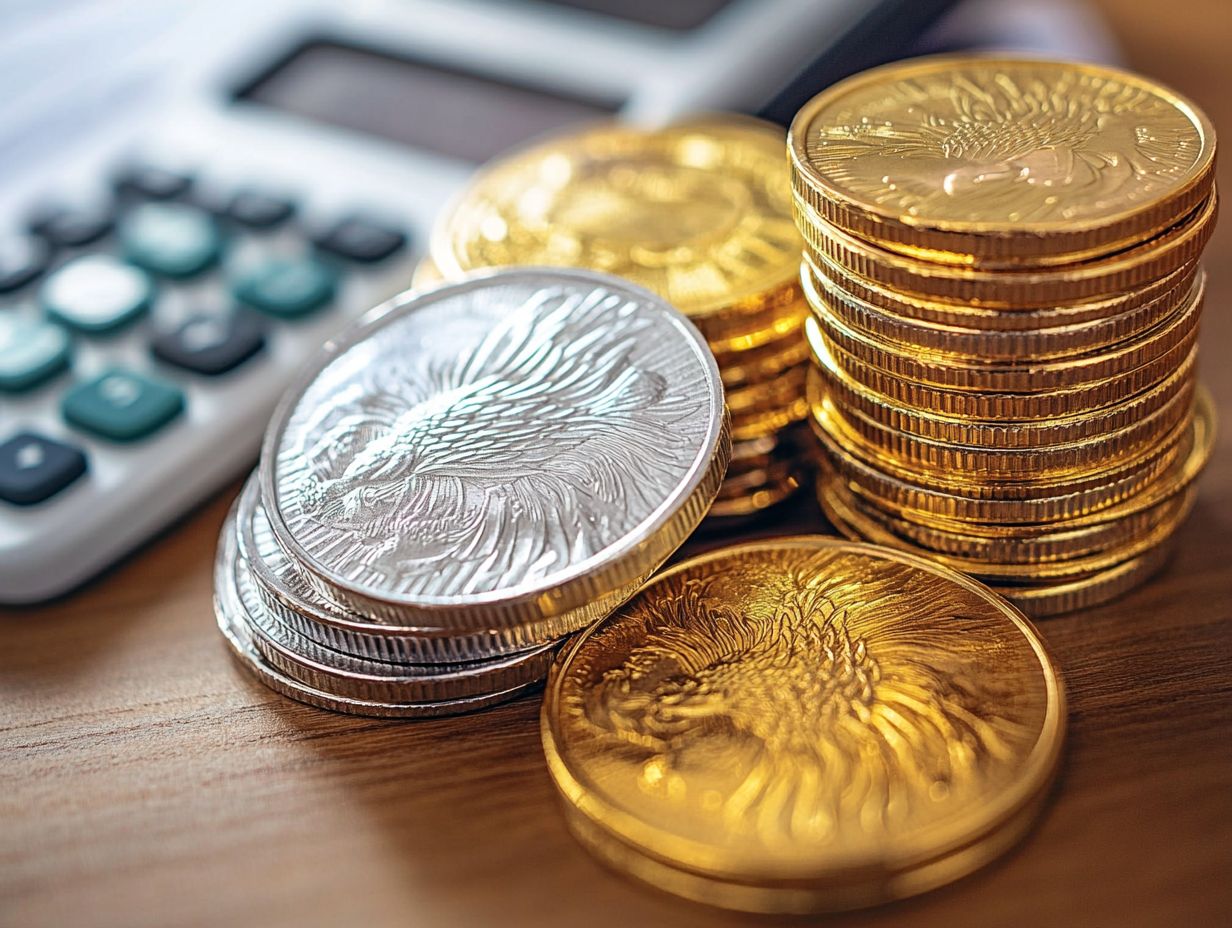
There are several types of storage options for precious metals, including bank safe deposit boxes, private vaults, and designated storage facilities. Each option has its own advantages and disadvantages, so it’s important to research and compare before making a decision.
How are storage costs calculated?
Storage costs for precious metals are typically calculated based on the weight and value of the metal being stored, as well as the length of time it will be stored. Some storage facilities may also charge additional fees for insurance, maintenance, and security.
Are there any factors that can affect storage costs for precious metals?
Yes, several factors can impact storage costs for precious metals. These can include the location of the storage facility, the current market value of the metal being stored, and any additional services or features included in the storage package.
Can storage costs for precious metals be negotiated?
In some cases, storage costs for precious metals may be negotiable. This can depend on the storage facility and the amount of metal being stored. It’s always worth asking if there are any discounts or promotions available when considering storage options.
What are some important considerations when choosing a storage option for precious metals?
When choosing a storage option for precious metals, it’s important to consider factors such as security, insurance coverage, accessibility, cost, and the reputation of the storage facility. It’s also vital to thoroughly read and understand the terms and conditions of the storage agreement before making a decision.
For more information on finding the best storage options for your precious metals, make sure to research and explore further!










